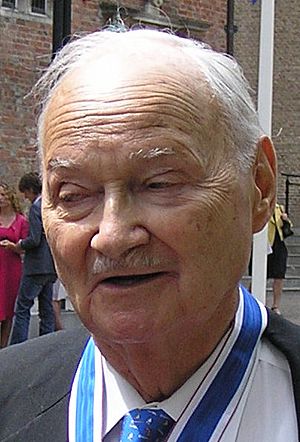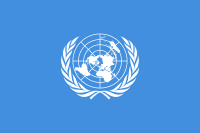Maurice Strong facts for kids
Quick facts for kids
Maurice Frederick Strong
|
|
|---|---|

Maurice Strong having received the Four Freedoms Award for Freedom from Want in 2010
|
|
| Personal details | |
| Born | April 29, 1929 Oak Lake, Manitoba, Canada |
| Died | November 27, 2015 (aged 86) Ottawa, Ontario, Canada |
| Spouses | Pauline Olivette (m. 1950, div. 1980) Hanne Marstrand (m. 1981, sep. 1989) |
| Parents | Frederick Milton Strong Mary Fyfe |
| Residences | Crestone, Colorado, U.S. (1972-1989) Lost Lake, Ontario London, United Kingdom Beijing, China |
| Occupation | Businessman, public administrator, UN official |
Maurice Frederick Strong (April 29, 1929 – November 27, 2015) was a Canadian businessman and diplomat. He played a very important role in protecting the environment around the world. He also worked as an Under-Secretary-General for the United Nations (UN).
Strong started his career in the oil business in Alberta, Canada. He became the President of Power Corporation of Canada before 1966. In the early 1970s, he led the United Nations Conference on the Human Environment. He then became the first head of the United Nations Environment Programme (UNEP).
He later returned to Canada to lead Petro-Canada and Ontario Hydro. He was also a commissioner for the World Commission on Environment and Development. This group studied how to protect our planet for the future. He was seen as a major leader in the global environmental movement.
Strong was also the President of the Council of the University for Peace from 1998 to 2006. He was an honorary professor at Peking University in China. Maurice Strong passed away in 2015 at the age of 86.
Contents
Early Life and Education
Maurice Strong grew up during the Great Depression. This was a time when many people faced serious poverty. His father often had to take odd jobs to support the family. His mother became ill and passed away.
He was born in Oak Lake, Manitoba, a small town in Canada. Strong later said that growing up during this tough time made him want to help others. He described himself as "a socialist in ideology, a capitalist in methodology." This means he believed in helping society but used business methods to do it. He left high school at 14 and never went to university. Despite this, he became the CEO of many large companies.
Business Career
In 1948, when he was 19, Strong started working for a company called James Richardson & Sons, Limited. He became very interested in the oil business. He moved to Calgary, Alberta, a big oil city. There, he met Jack Gallagher, an important person in the oil industry.
Strong worked for Gallagher's company, Dome Petroleum. He held several important jobs, including vice president of finance. In 1956, he left Dome Petroleum to start his own company. He helped people find good opportunities in the Alberta oil fields.
In the 1950s, he took over a small natural gas company called Ajax Petroleum. He helped it grow into a very large company, Norcen Resources. This success caught the eye of Power Corporation of Canada. This was a major investment company in Canada. They made him their executive vice president and then president from 1961 to 1966.
In 1976, the Prime Minister of Canada, Pierre Trudeau, asked Strong to come back to Canada. He was asked to lead the new national oil company, Petro-Canada. Later, in 1992, he became the Chairman of Ontario Hydro. This was one of the biggest power companies in North America.
Working with the United Nations
Maurice Strong first worked with the UN in 1947. He had a temporary job as a junior security officer. He soon returned to Canada. With help from Lester B. Pearson, he helped create the Canadian International Development Agency (CIDA) in 1968. CIDA helps developing countries around the world.
The Stockholm Conference
In 1971, Strong asked for a special report about the health of our planet. It was called Only One Earth: The Care and Maintenance of a Small Planet. This report was prepared for the first ever UN meeting on the environment. This meeting was held in Stockholm in 1972. It was the world's first "state of the environment" report.
The Stockholm Conference was very important. It made environmental protection a key part of global development. After this meeting, the UN created the United Nations Environment Programme (UNEP) in December 1972. UNEP's main office was in Nairobi, Kenya. Strong was chosen to be its first leader. UNEP was the first UN agency to have its headquarters in a developing country. As the head of UNEP, Strong brought together the first international experts to talk about climate change.
Strong also served on the World Commission on Environment and Development. This group was set up by the United Nations in 1983.
The Earth Summit
Strong also led the UN's program to help with famine in Africa. This was one of many important jobs he had with the UN. He was later appointed to lead the UN Conference on Environment and Development. This meeting is better known as the Earth Summit. It took place in Rio de Janeiro, Brazil, from June 3 to June 14, 1992.
Strong believed that the people at the Rio Conference agreed on good ideas. However, he felt they did not promise enough action to stop global environmental problems. He thought they should spend much more money on environmental projects in developing countries. UN Secretary General Boutros Boutros-Ghali agreed. He told the delegates that their promises were "not comparable to the size and gravity of the problems."
After the Earth Summit, Strong continued to work hard to make its goals happen. He helped create the Earth Council. He also helped lead the Earth Charter movement. He was involved with many other important environmental groups. These included the World Resources Institute, the International Institute for Sustainable Development, and the World Wildlife Fund. Strong did all this public service work without pay. He was able to do this because of his success in business.
Strong also worked to change how NGOs (non-governmental organizations) viewed the World Bank. Some people believe he inspired former U.S. Vice President Al Gore's work on climate change.
University for Peace
In 1999, Strong took on the challenge of helping the University for Peace in Costa Rica. This university was created by the United Nations. Its reputation was in trouble due to problems with management. As the head of its governing body, Strong helped to make the university strong again. He helped rebuild its programs and leadership. He retired from the university in 2007.
From 2003 to 2005, Strong was a special helper to UN Secretary General Kofi Annan. He helped lead the international effort to support North Korea with humanitarian aid.
Later Years
In 2012, Strong contributed to a book for the Rio+20 conference. This book looked back at 40 years of environmental efforts and future challenges. He also attended the conference.
Death and Legacy
Maurice Strong passed away on November 27, 2015, in Ottawa, Ontario, Canada. He was 86 years old. A funeral service was held in December 2015. A public memorial service took place in January 2016. Many important people spoke at the service, including James Wolfensohn and Adrienne Clarkson. Tributes were also sent from leaders like Mikhail Gorbachev and Kofi Annan.
Strong was known for his amazing network of connections. He could bring together many different groups of people. He was very good at political planning to achieve his goals. He was very important in helping environmental non-governmental organizations get funding and be part of international meetings.
Awards and Honours
Maurice Strong received many awards and honours for his work. He was given 53 honorary doctorate degrees. He also held honorary visiting professorships at 7 universities.
Some of his top Canadian honours include:
- Companion of the Order of Canada (1999)
- Order of Manitoba (2005)
- Queen Elizabeth II Silver Jubilee Medal (1977)
- 125th Anniversary of the Confederation of Canada Medal (1992)
- Queen Elizabeth II Golden Jubilee Medal (2002)
- Queen Elizabeth II Diamond Jubilee Medal (2012)
He also received international honours like:
- Order of the Polar Star (Sweden) (1996)
- Order of the Southern Cross (Brazil) (1999)
- Commander of the Order of the Golden Ark (Netherlands) (1979)
Other important awards include:
- 2003: Public Welfare Medal from the US National Academy of Sciences (first non-US citizen to receive it)
- 2002: Jack P. Blaney Award for Dialogue
- 1995: IKEA Environmental Award
- 1994: Asahi Glass Foundation Award: Blue Planet Prize
- 1994: Jawaharlal Nehru Award for International Understanding
- 1993: International St. Francis Prize for the Environment
- 1993: Alexander Onassis Delphi Prize
- 1989: Pearson Medal of Peace
- 1981: Charles A. Lindbergh Award
- 1974: Tyler Environmental Prize
He was also a Fellow of the Royal Society of Canada and the Royal Architectural Institute of Canada.
Images for kids
 | Valerie Thomas |
 | Frederick McKinley Jones |
 | George Edward Alcorn Jr. |
 | Thomas Mensah |




